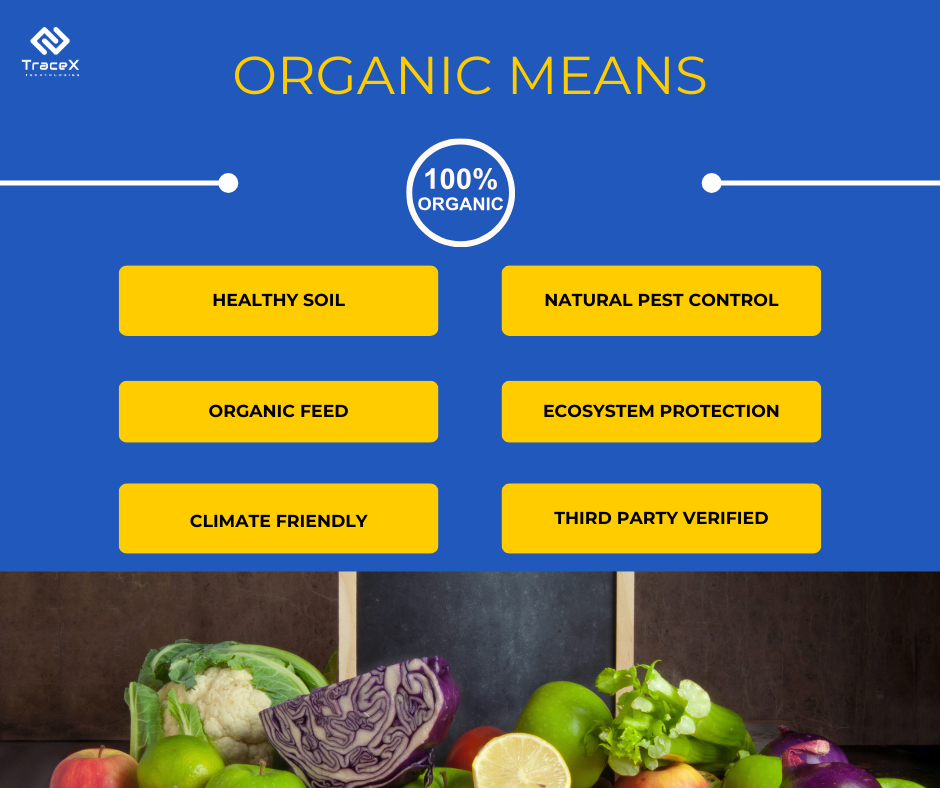Contact: +91 99725 24322 |
Menu
Menu
Quick summary: Discover how Organic Certification in Agriculture is evolving with digital traceability. Learn how transparency, blockchain technology, and real-time compliance tools like TraceX are transforming trust in organic supply chains.

Organic Certifications in Agriculture ensure transparency, sustainability, and consumer trust by verifying that products are grown without synthetic inputs and meet strict environmental and ethical standards. It builds accountability across the supply chain from farm to market by promoting traceable, eco-friendly, and socially responsible practices. Through certifications like NPOP, USDA Organic, EU Organic, and IFOAM, agribusinesses can demonstrate compliance, access premium markets, and strengthen brand integrity. Supported by digital traceability tools and blockchain technology, organic certification transforms agricultural value chains into transparent, trustworthy systems that align with global sustainability and ESG goals.
Organic Certifications guarantee that consumers receive products that meet specific standards. Many American consumers are willing to pay a premium, up to 116% above the market price, for the assurance that a product is organic.
Organic certification in agriculture goes far beyond being simply “chemical-free.” It represents a verified commitment to sustainable farming practices that nurture soil health, protect biodiversity, and promote fair treatment of farmers. As global consumers increasingly seek transparency and authenticity in their food choices, the demand for certified organic produce has surged across export markets. Organic certification serves as a trusted seal that guarantees not only the absence of harmful inputs but also adherence to ethical, environmentally responsible, and socially equitable farming systems ensuring that every product from field to shelf reflects integrity, sustainability, and trust.
Key takeaways
Want to learn how digital traceability empowers farmers and brands to scale organic agriculture sustainably?
Read our blog on Organic Farming Transformation →
Confused about Fairtrade, Organic, Rainforest Alliance, or UEBT certifications?
https://tracextech.com/sustainability-certifications-agriculture/
The core principles of organic certification in agriculture are rooted in ensuring that farming practices meet specific environmental, social, and health standards. The key frameworks include India’s NPOP (National Programme for Organic Production), USDA Organic (United States Department of Agriculture), EU Organic standards, and IFOAM (International Federation of Organic Agriculture Movements) standards.
These standards collectively support sustainable agriculture by encouraging environmentally friendly practices, equitable social conditions, and strong market integrity. Adhering to these pillars enables stakeholders along the supply chain to meet global expectations for responsible and sustainable food production.
Organic certification is not just about proving what’s absent (like synthetic inputs); it’s about continuously verifying what’s present: ethical farming practices, biodiversity protection, and clean, traceable data. Yet, this verification journey is fraught with challenges that go far beyond paperwork.
Most organic produce originates from fragmented smallholder networks, where farms are dispersed and often lack digital tools. This leads to low data visibility auditors and buyers have to rely on inconsistent, manual logs that make real-time validation nearly impossible. As a result, certification becomes a reactive process, handled during audit season rather than a continuous cycle of verification.
Manual documentation introduces errors, duplication, and data loss, while repeated verification cycles create “certification fatigue” among farmer groups. For agribusinesses and exporters, this means higher operational costs, delayed approvals, and risk of non-compliance when data fails to meet global standards.
Perhaps the biggest risk is fraud and greenwashing. Without transparent data trails, even well-intentioned producers can lose credibility. A single unverifiable claim can cast doubt on an entire supply chain. In a global market where consumers expect proof, not promises, traceability becomes the backbone of trust.
By leveraging digital platforms like TraceX, the organic sector can shift from reactive audits to continuous assurance where every input, inspection, and certification update is captured in real time. This creates not just compliance-ready systems, but credibility-driven value chains where organic truly means authentic, verified, and sustainable.

Organic certification is no longer just a label, it’s a data-driven proof of integrity. In today’s global supply chains, where organic fraud and compliance fatigue are real threats, digital traceability is emerging as the single most reliable backbone for verification, trust, and market access.
Traditional organic audits often rely on fragmented paperwork and delayed reporting. With digital traceability platforms from TraceX, every input from seed source and biofertilizer use to crop rotation and pest control is captured at the point of origin. This continuous data flow creates an auditable, tamper-proof trail that certifiers can verify instantly. It replaces reactive audits with continuous compliance monitoring.
Blockchain doesn’t just secure transactions it secures trust. By recording every event (inspection, batch creation, shipment) on a distributed ledger, exporters and regulators gain access to an immutable proof of organic authenticity. This reduces the risk of falsified certificates, mixed lots, or “greenwashed” claims, especially in complex spice and coffee value chains.
Digital tools now enable geo-mapped farm boundaries and mobile audit apps that validate compliance in real-time. Inspectors can verify practices directly on-site, attach photographic evidence, and link certification data to specific coordinates, ensuring that what’s labeled “organic” truly comes from certified soil.
For exporters and certification bodies, real-time dashboards centralize farm data, inspection reports, and sustainability metrics. TraceX’s dashboard automates report generation for Organic, Fairtrade, and Rainforest Alliance audits cutting audit preparation time from weeks to hours and reducing compliance costs.
Organic India partnered with TraceX to modernize its agricultural operations end-to-end from farm to shelf. By adopting TraceX’s digital traceability platform, Organic India was able to:
This seamless integration allowed Organic India to increase operational efficiency, maintain certification integrity, and boost market trust, proving that sustainability and scale can coexist when powered by robust traceability.
[Read the full Organic India case study] to see how these technologies were implemented in practice and the outcomes achieved.

Partnerships with digital platforms like TraceX help agri-businesses and certification bodies drastically reduce certification timelines and manual workloads by shifting from fragmented, paper-heavy processes to automated, data-driven systems.

Digital tools collect farmer input and process data at the source through mobile apps or QR tagging, eliminating redundant data entry and reducing human error.
Instead of preparing for audits once a year, TraceX enables real-time audit readiness. Data on organic inputs, sustainability practices, and processing steps is automatically logged and accessible to certifiers.
Each record of seed source, fertilizer type, and processing batch is stored on a tamper-proof blockchain ledger, ensuring data integrity and instant traceability for inspectors and buyers.
Certifiers gain access to real-time dashboards showing compliance KPIs, pending actions, and farm-level data. This replaces multiple site visits and paper-based verifications, cutting audit time by up to 60%.
Platforms like TraceX automatically generate compliance reports for Organic, Fairtrade, and ESG standards, aligning with multiple frameworks in one workflow.
Certifications that once took months now close in weeks, operational teams spend less time chasing paperwork, and both exporters and certifiers operate with full confidence in verified digital data.
Organic certification isn’t just a regulatory requirement; it’s the foundation of trust and transparency in modern agriculture. As markets evolve, the fusion of technology and sustainability is redefining how producers prove authenticity and maintain consumer confidence. Digital traceability platforms like TraceX are leading this transformation, providing real-time visibility, automated audits, and verifiable proof of organic practices. By connecting farmers, certifiers, and consumers through trusted data, the future of organic agriculture lies in systems that are digitally transparent, ethically driven, and sustainability-first.
Discover how blockchain is transforming transparency, trust, and food safety from farm to fork.
Read the Blog on Blockchain-Powered Traceability →
Learn how leading agribusinesses are adopting responsible sourcing practices that build trust and resilience.
Read the Blog on Ethical Supply Chains →
Find out how technology is helping farmers and enterprises reduce waste, improve soil health, and meet ESG goals.
Read the Blog on Sustainable Agriculture →
Organic certification ensures that farming practices meet defined standards for environmental sustainability, soil health, and ethical production—offering verified assurance to consumers.
Digital traceability captures and secures data across every step of the supply chain, enabling continuous compliance, faster audits, and fraud prevention.
Transparency builds consumer trust and brand credibility while helping farmers and exporters meet global organic, Fairtrade, and ESG standards efficiently.
